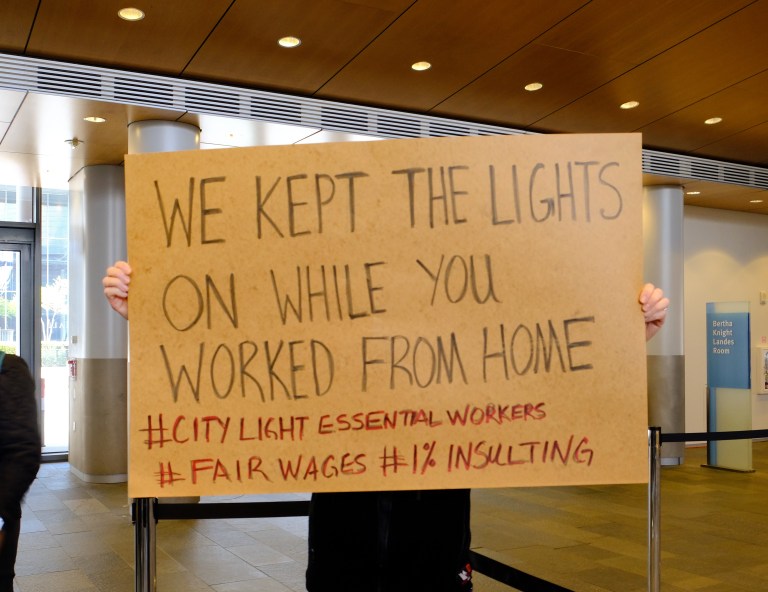
By Erica C. Barnett
Last week, King County Councilmember Reagan Dunn proposed a resolution urging King County Executive Dow Constantine to “quickly re-hire” the 281 King County employees who lost their jobs because they refused to get the COVID vaccine. Speaking at a council meeting last Wednesday, Dunn said his resolution would help the county fill “a lot of employee vacancies, both in the sheriff’s department and the jail and other areas of the county.”
All of the fired employees were ruled ineligible for the county’s religious exemption, which allowed people to claim that the vaccine was against their religion. Under the county’s current rules, the fired employees have the right to be rehired to their previous jobs as long as they remain eligible and their job classification still exists.
County Councilmember Claudia Balducci noted that in nearly 40 minutes of self-pitying comments from former employees, “I didn’t hear one word about our commitment to the people we serve and keeping them safe.
Among other reasons, sheriff’s deputies claimed that they shouldn’t have to be vaccinated because the vaccine uses fibroblast cells that originated with fetal cells derived from two fetuses in the 1960s. “All of the available vaccines at the time [of the terminations] were created with aborted fetal tissue,” Enumclaw-based officer Jason Brunner declared, inaccurately. “Because I believe that all children are innocent and precious in the eyes of God. I couldn’t very well put that vaccine into my body when I am vehemently against the the abortion aspect. As such, I was persecuted, along with my brothers and sisters, for our sincerely held religious beliefs.”
As KING-5 reported in 2021, almost every Christian denomination, including the Catholic Church, allows vaccines, including the COVID-19 vaccine.
Because King County no longer has a vaccine mandate, the fired employees are eligible to re-apply for their former positions. Former sheriff’s deputies who spoke during public comment last week argued this process was insulting and “frightening” because they would have to go through a probationary period as new hires. They also demanded back pay for the time they have not been employed by the county. Of about 25 members of the King County Police Officer’s Guild who were terminated because of the mandate, only 12 have expressed an interest in returning, a county staffer confirmed during the meeting—4.7 percent of the 252 vacancies at the sheriff’s department.

County Councilmember Claudia Balducci pointed out in a Twitter thread that the county’s labor unions are already in negotiations that will result in rehiring many employees who lost their jobs because they didn’t want to protect themselves and others against COVID-19. On Wednesday, Balducci noted that in nearly 40 minutes of self-pitying comments from former employees, “I didn’t hear one word about our commitment to the people we serve and keeping them safe. I heard only about the impact on the employees. We are here with a mission, and our mission is to serve the public.”
To Balducci’s point: The COVID vaccine saves lives and has prevented many cases of severe COVID. And COVID continues to kill even as government entities treat their own decisions to require vaccines like an ill-conceived, fear-driven folly.
About 85 percent of King County residents received an initial two-dose vaccine, but only a third are fully vaccinated. Those who aren’t fully vaccinated are far more likely to die or be hospitalized from COVID, according to the county’s COVID data dashboard. Since the date when King County implemented its vaccine mandate, more than 7,700 King County residents have been hospitalized for COVID, and more than 1,400 have died. Three-quarters of the people in both of these groups were not fully vaccinated against the disease. Since the end of the county’s vaccine mandate in February of this year, 91 people have died of COVID countywide; about three-quarters of that group were not fully vaccinated.




 By Erica C. Barnett
By Erica C. Barnett
 The interim
The interim